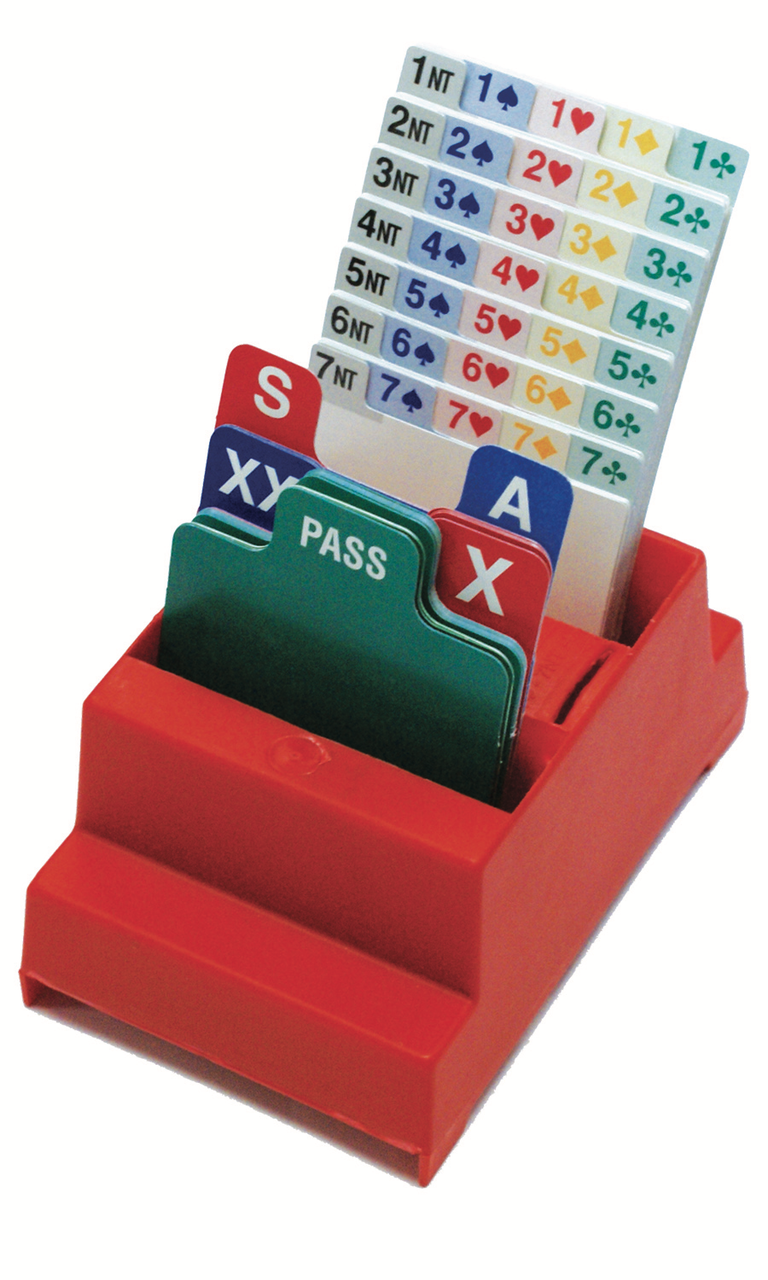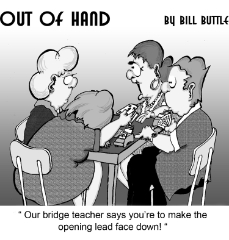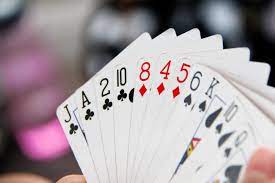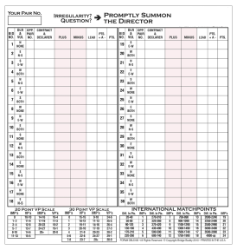| Never Give In.... |
Winston Churchill's Words ring out loud and clear. Some advice for you.
|
|
|
|
| 10 Ways To Be A Better Bridge Partner |
10 Ways To Be A Better Bridge Partner
|
|
|
|
| Using Bidding Boxes |
 When you play in a duplicate game, you must use bidding boxes. There will be 4 boxes on each table. This YouTube video describes the bidding box and how it is used.
|
|
|
|
| How To Use Bridgemates |
How to use Bridgemates.pdf
Bridgemates
- North/South is responsible for all entries to the Bridgemate.
- At the conclusion of a hand North/South must present the Bridgemate to either East or West for approval of the result.
When scoring with Bridgemates, although North inputs the score, it is either East or West’s job to approve the score and be sure it is right. At the end of the game, there will be a message on the screen that all rounds have been played. Be sure all scores are input with final approval given.
|
|
|
|
| Fragrance Free Please. |
 Our games are “No Fragrance”. Some people are highly allergic or have severe reactions, so please do not wear perfume, cologne, or scented oils or hair spray.
|
|
|
|
| Sign Up and Payment |
The process for signing up is easy. A reminder email will be sent to you the weekend before the game. You can click on the link to the Google Sheet to sign up any time the week before the game. One person can sign up for a partnership and both will be registered, or if you need a partner, you can let us know and we will find one for you. To end just click on the x on the browser window it will be saved automatically.
The $12 fee can be paid in person on the day of the game. Please bring exact change, if possible. We ask that if you have to cancel you let us know as soon as possible. The links for the games are under "Sign up here" on the Menu of the website.
..... see less
The process for signing up is easy. A reminder email will be sent to you the weekend before the game. ..........
..... see more |
|
|
|
| Courtesy and your To-Do list |
- DO go over your convention card with partner before the game starts.
- DO turn off your cell phone before the game begins. (See director for emergency situations)
- DO say hello to all opponents when you start a new round.
- DO be ready to bid and play when it’s your turn.
- DO count your cards.
- DO alert and announce all bids that require an action.
- DO try making your bids and plays in an even tempo whenever possible; avoid hesitations; be consistently deliberate in your bidding and play.
- DO call the director nicely and raise your hand when an infraction occurs.
- DO compliment partner (or the opponents!) on good play after the hand is finished.
- DO observe the time allotted for the play of each round and be prepared to make a concerted effort to catch up if you have fallen behind, regardless of the reason for the lateness. If given a late play, don’t whine.
- DO NOT delay the bidding or play by doing some distracting thing (including writing on your convention card or posting the contract in the Bridgemate) when it is your turn to do something).
- DO NOT reach for or touch a card in the bidding box until you are certain what you are going to do – to do otherwise is to invite a director call.
- DO NOT snap your cards on the table.
- DO NOT make comments to anyone during play, make faces or use body language.
- DO NOT point out mistakes or criticize partner or opponents at the table.
- DO NOT make a ruling or allow an opponent to make a ruling – always call the director.
- DO NOT hold a post-mortem with partner until all hands are finished for the round.
- DO NOT stand next to any table where you can see the cards.
- DO NOT get boards from a slow table that you are going to play. Ask the director to get the boards, but never do so until the round has been called.
- When the round is called, move all boards (not being played) to the appropriate table. North/South is responsible.
..... see less
- DO go over your convention card with partner before the game starts.
- DO turn off your cell phone before the game begins. (See director for emergency situations)
- DO say hello to all opponents when you start a new round. ..........
..... see more |
|
|
|
| Responsibilities |
Once a card has been turned over it cannot be looked at again. Any player who has not turned over their card yet, may ask to see any of the other cards of that trick. No one may go back to check tricks or to see where you should play from. It is Dummy’s responsibility to know where play should come from.
Declarer: a card touched is a card played. If you are calling for dummy to play your cards, once you have named a card it is deemed played. If you have made a slip of the tongue you may change the call but without pause for thought.
Dummy may not speak at all except to say to declarer: ‘your hand’, ‘on the table’, ‘having none?’ If a defender notices their partner not following suit, they may say ‘having none?’ No one else can say it.
Hesitation gives information. When you hesitate while declarer is finessing through you, you make it obvious that you have the finessed card. If you don’t have the finessed card your hesitation would be an attempt at fooling declarer into thinking that you do. This is cheating. At low level of bidding you can take as long as you like over a bid, but then you should not pass. You are indicating to your partner that you have almost enough points for a particular bid and therefore to pass would be cheating. At higher levels of bidding hesitation is permitted. You may be contemplating a slam for instance.
..... see less
Once a card has been turned over it cannot be looked at again. Any player who has not turned over their card yet, may ask to see any of the other cards of that trick. No one may go back to check tricks or to see where you should play from. ..........
..... see more |
|
|
|
| Opening Lead |

After a bid, double or redouble has been followed by three passes in rotation, the defender on presumed declarer's left makes the opening lead.
Face-Down Opening Leads take place in Face-to-Face Games. The first thing to make clear is that it is the card that must be face-down—not the player—on the opening lead. (hence the funny cartoon)
Now that this important distinction has been made (!!), let's tackle the reasoning behind it. The opening lead is often crucially important. So, the opening leader would very much like to get it right, and of course it would be great
If his or her partner could just tell him what card to lead—but that wouldn't be cricket (or bridge)! There are sometimes ways and means to get around the rules, however—for example, if the opening leader's partner were to ask some very pointed questions about what the opponents meant when they bid a particular suit, his interest in that suit might tip off the opening leader as to the best lead.
That is why only the opening leader is allowed to ask questions about the opponents' bids before selecting his or her lead. But, by the same token it obviously wouldn't be fair to totally bar the other defender from asking questions about the auction.
So, as a compromise, after the opening leader has asked his questions about the auction, he must place his opening lead face-down on the table and say "Do you have any questions, partner?" At this point, the opening leader's partner may ask questions to his heart's content - but the opening lead cannot be changed. Once the opening leader's partner has asked all his questions or indicated that he has no questions, then the opening lead is flipped over and the play of the hand begins.
Give everyone at the table a chance to tell you if it isn't your lead. You can take back the face-down lead without any penalty. However, if the declarer or dummy states that the wrong person is leading, the Director should be called to the table immediately. But, if an opening lead is made face up (out of turn), the first thing to do is for the declarer (the person who was supposed to be declarer) to (politely) call for the director by raising his hand and saying "director please." Don't make your own table ruling--that's what directors are there for.
There should be no acrimony, no hard feelings and no embarrassment. This is just part of the game (like any other error) and the proper procedure should be followed.
So next time your partner says: “Any questions, partner?” don’t look at her as though she’s got rocks in her head, she is merely following protocol. If you have no questions and it is partner’s opening lead, say “no questions, partner!"
The director will explain to the declarer that he has 5 (yes, 5!) options. I am often asked which one declarer should choose. There is no cut and dried answer. It depends.
If you want to know the 5 options check out Larry’s page:
https://www.larryco.com/bridge-articles/my-opponent-has-made-the-opening-lead-out-of-turn
from Grand River Bridge Club, Kitchener and Larry Cohen
..... see less
After a bid, double or redouble has been followed by three passes in rotation, the defender on presumed declarer's left makes the opening lead.
Face-Down Opening Leads take place in Face-to-Face Games. The first thing to make clear is that it is the card that must be face-down—not the player—on the opening lead. ..........
..... see more |
|
|
|
| When partner shows out of a suit |

What to do when partner shows out of a suit that is lead?
When your partner has not followed suit when it is their turn, to avoid problems or reneging it is proper to ask your partner “No clubs/diamonds/hearts/spades, partner?”
The terms “Revoke” and “Renege” are used interchangeably at the bridge table when a player fails to follow suit when able to do so. For example, a Spade is led. You have a Spade but play a Heart. “Revoke” is the German term and “Renege” is the French equivalent.
When a revoke has been established, call the director. They will explain how to proceed.
There is always at least a one-trick restoration of equity for a revoke. However, if you win the trick with the revoke card plus a trick later on, there is a two-trick restoration of equity. This is not a penalty. It is an adjustment of tricks taken, made to keep things even at the table.
If the revoke has prevented a line of play that would give declarer more tricks, declarer may get an adjusted score from the director. For example, in a No Trump contract, if a revoke prevents an opponent from running a long suit that would have run without the revoke, an adjustment to the score will be made by the director at the end of the hand.
Try to play carefully and not revoke (or renege.) It keeps life simpler.
..... see less
What to do when partner shows out of a suit that is lead?
When your partner has not followed suit when it is their turn, to avoid problems or reneging it is proper to ask your partner “No clubs/diamonds/hearts/spades, partner?”
The terms “Revoke” and “Renege” are used interchangeably at the bridge table when a player fails to follow suit when able to do so. For example, a Spade is led. You have a Spade but play a Heart. “Revoke” is the German term and “Renege” is the French equivalent.
When a revoke has been established, call the director. They will explain how to proceed. ..........
..... see more |
|
|
|
| How to Fill out the Score Card for every game. |
|
|
|
| Convention Card Part 1 |
Josee has given a wonderful instruction PDF of filling out the Convention Card.
-
All players should have a completed convention card at the table.
-
You may not refer to your card during the auction or play.
-
Either opponent may ask to see your convention card at any time it is their turn to bid or play.
|
|
|
|
|
|
|
|
|
|
| Score card used each event |

You will re-use the front of your convention card many times. It is advisable to get a card holder/protector. Then each time you play, at least one of the partnership will keep score of the hands that you play.
This is a copy of what that sheet looks like. When you get to the table you make note of what boards you are playing, and put the partnership pair number of the opponents in there. Make note of the contract and who is playing the hand. Optional but always interesting to note is the opening lead. These things can be put in as the bidding ends. Then when the hand is finished put the contract score in the correct box.
You can copy this image and print it out or blow it up to view it more closely.
..... see less
You will re-use the front of your convention card many times. It is advisable to get a card holder/protector. Then each time you play, at least one of the partnership will keep score of the hands that you play. ..........
..... see more |
|
|
|